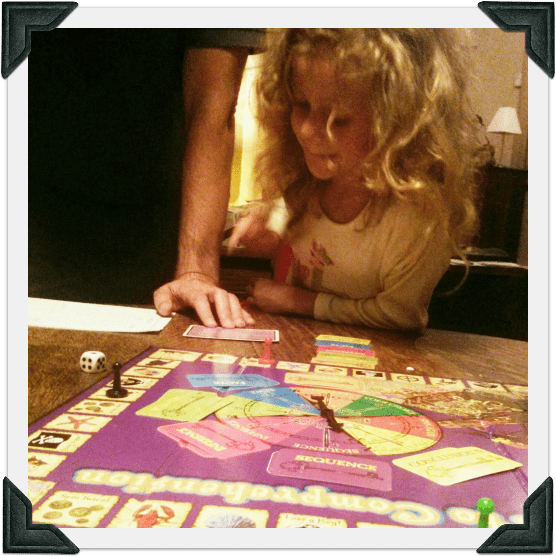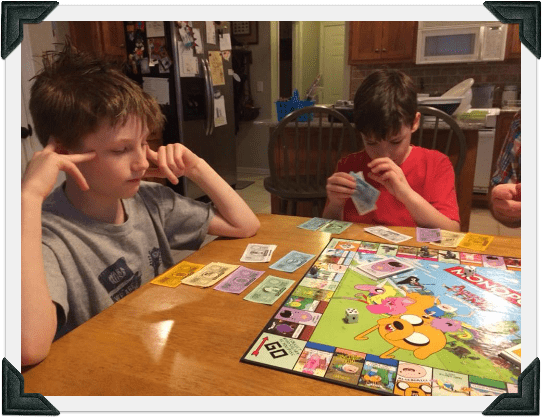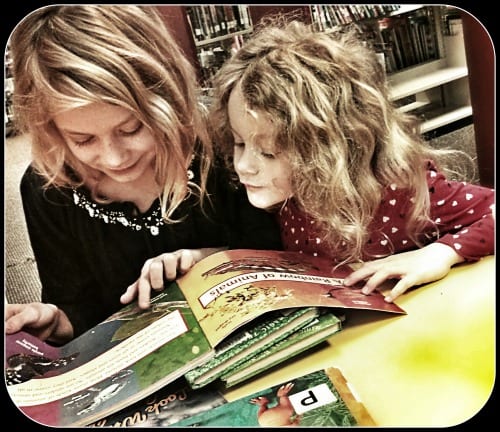Put Some Cool in Your Homeschool with These Educational Board Games

I recently attended a homeschooling conference where games (both table-top and video/app) were discussed as a way to hone skills like math, critical thinking, reading, and spelling for success in academic studies. The handout for the workshop listed 24 different topics (and related games) from art to engineering and from biology to money management skills. And that wasn’t even an exhaustive list.
Playing table-top games is one of the most creative ways to get your kids to learn and engage in higher-order functions without an obvious “educational” aspect. And games also great for nurturing social and inter-personal skills.

Our list below doesn’t even scratch the surface of games that offer an educational element. In reality, most every game requires a set of skills to be successfully played and won. It’s just a matter of figuring out what educational element you’re looking to strengthen and what games fits.
Clue
A classic “whodunnit” and the current favorite at our house, Clue tests a player’s deductive reasoning skills, demands good record-keeping, and teaches the all-important skill of The Bluff. Cards with the murderer, weapon, and the room in which the deed was done are placed in an envelope at the beginning of the game. Players are then dealt the remaining cards. Through deductive reasoning each player must figure out what cards are in the envelope by making accusations (it was Ms. Peacock in the kitchen with the knife) to figure out the cards other players hold (and ultimately what’s missing). The winner uses logic to solve the murder.
There are a lot of different versions of this board game, but we play the classic version with all the original suspects, murder weapons, and rooms in the mansion.
Skills: Memory, deductive reasoning, strategy, record-keeping
Number of players: 3 – 6
Suggested Ages: 8+ (although our 7 year old plays it)
Yatzee!
Yatzee! is another a another classic we love, this time offering a heavy dose of math with counting, addition, and pattern recognition along with basic strategy skills. It’s a game played with 5 dice, rolled up to 3 times a turn to make a “hand” (much like in poker) in 1 of 13 categories. Players try to fill their score card for each category (sometimes that’s not possible, so players have to enter zero). This is where strategy and risk-taking comes into play. Players must decide when to take the numbers they roll or go for a different “hand.” The game is over when everyone has entered a score for every category. The scores are tallied (addition) to determine the winner.
Skills: Counting, addition, pattern recognition, strategy, probability
Number of players: 2 – 10
Suggested Ages: 6+

Monopoly
No list of board games would be complete without Monopoly, the real estate game that has players purchasing and developing land in order to dominate the board. It requires a lot of different skill sets to win (or even stay in the game). Monopoly not only requires math and reading skills to play, but also advanced management skills (like the ability to manage money, debt, and properties). However, the most used skills in Monopoly, once those other skills are mastered, are negotiating and strategy. Players must be able to negotiate with other players to get the properties they may need for winning the game and must work together even though they are at odds with each other. The one who wins is usually the most adept at both strategy and making deals.
Of the three classic games mentioned here, Monopoly is probably the one with the most to offer and most flexible game play. You can change the rules to suit the age of your child and can focus on any of the skills you want as the child gets more adept at playing the game. Plus, it’s always educational when you’re the banker. Now there are even favorite character-themed versions of the game to pique your kid’s interest, like Adventure Time, Doctor Who, Disney, and more.
Skills: Counting, addition, reading, strategy, reasoning, social skills, money management, probability, decision-making, negotiating, goal-setting
Number of players: 2 – 8
Suggested Ages: 8+ (although we’ve played as young as 6 with help)
Apples to Apples
Currently in heavy rotation with Clue at our house, Apples to Apples (we play the Junior version) is a great game for developing creative writing skills. The game is comprised of two decks of cards: red adjective and green noun cards. Players are dealt a hand of red noun cards they play against a green adjective card that’s shown by a judge each round. Players pick the best fit from their hand (or sometimes most outrageous if the player is a skilled story-teller) for the the adjective card that’s in play and the judge gets to listen to each player’s explanation for why their card is the best. The winner is awarded the adjective card.
Skills: Creativity, storying-telling, reading, vocabulary
Number of players: 4 – 10
Suggested Ages: Junior edition is for 9+ (although our 7 year old plays), Standard edition is 12+
Munchkin
Munchkin is at the top of our list of “must haves” to introduce the kids to elements of fantasy RPGs (role playing games) and was picked as one of 8 “Best Overall” games in the workshop I attended. RPGs have been found to offer a wide range of educational benefits to players. Most obvious is the ability to use strategy and critical thinking during game play along with a heavy dose of creativity, decision-making, math, of course, reading.
While Munchkin is not a “classic” role playing game, we’re looking forward to dipping our toes into that world, then move on to more advanced games that involve sophisticated role playing.
Munchkin is a bit irreverent and crass, so proceed with that in mind.
Skills: Strategy, critical thinking/decision making, creativity, counting and math, reading
Number of players: 3 – 6
Suggested Ages: 10+
Looking for more topics about homeschooling, specifically in Huntsville & Madison County?
See all the posts in this series HERE.
You Might Also Like…
Karen Gann had a marketing communications career in high tech before taking a sharp turn into stay-at-home-momdom and homeschooling. She grew up in the Tennesse Valley, lives in Huntsville, and is wife to the wittiest man alive, mother to two head-strong and independent girls (they're adorable, really), and human caregiver to the cats. Addictions include Facebook, Pinterest, NYC's Radio Lab, coffee, food, and politics (not necessarily in that order but sometimes all at the same time). She's also the marketing director for Pandia Press in her spare time.










